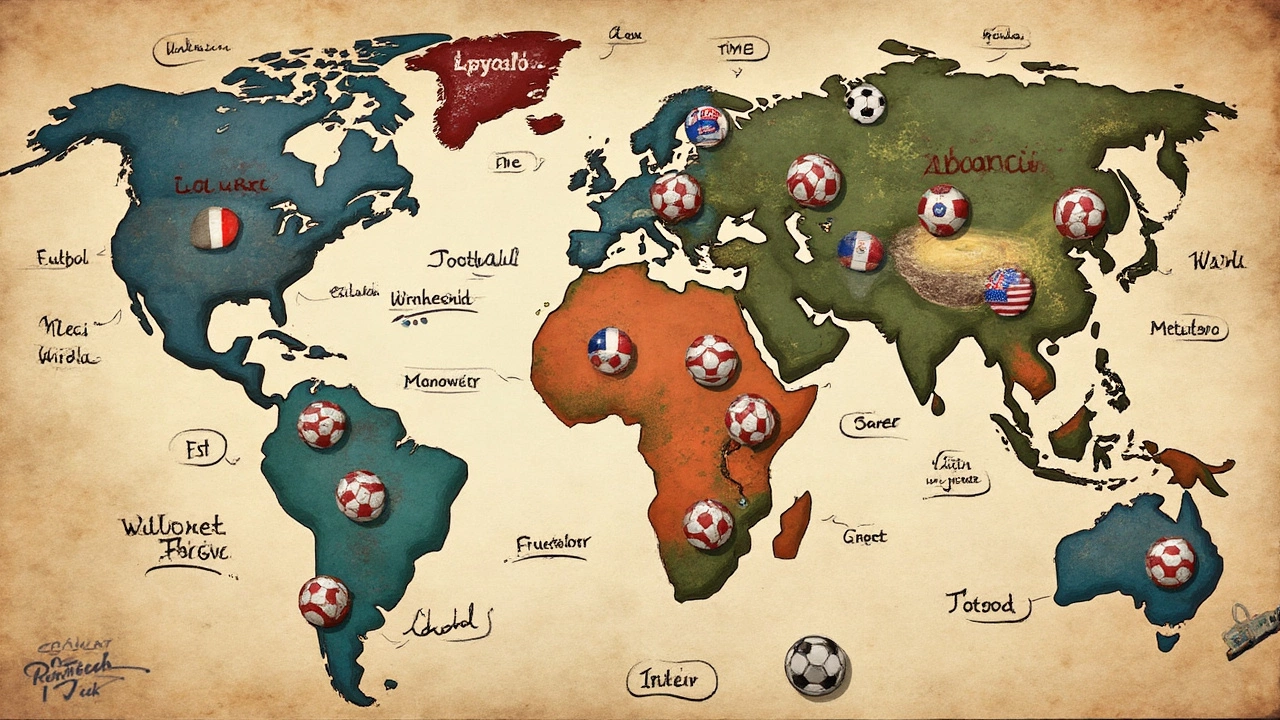If someone says "FIFA football" and you're scratching your head, you’re definitely not alone. The phrase pops up on TV, in gaming, and whenever there’s a big match, but it actually confuses a lot of people. Want to know what it really means and why people use it? Let’s clear it up.
First off, FIFA isn’t a way to describe a style of football. It stands for “Fédération Internationale de Football Association”—yeah, it’s French, but all it means is the world group that runs football. So when folks say "FIFA football," they're usually talking about international games, especially the famous FIFA World Cup. Some even use it to refer to the insanely popular video game series, but that’s another story.
Where things get messy is the name itself. Depending on where you live, you might call it football, soccer, or something else entirely. But every time you hear "FIFA football," think about those global tournaments where the world's top teams face off—it’s the big leagues, not just a random game at your local park.
- Why Do People Say FIFA Football?
- What Does FIFA Stand For?
- Football vs. Soccer: The Name Game
- FIFA’s Main Event: The World Cup
- Cool Facts You Probably Didn’t Know
- Tips for Enjoying FIFA Matches
Why Do People Say FIFA Football?
It’s wild how often you’ll hear people say “FIFA football” and mean totally different things. Some use it when talking about the big, international football events. Others just use it for anything related to the FIFA video games. Either way, the word “FIFA” gets thrown around a lot, and not always correctly.
Here’s why people started saying it in the first place: FIFA is the official organization behind the biggest football tournaments on the planet, especially the World Cup. So when people want to talk about international football, or anything that feels ‘big league,’ they skip the long name and just say “FIFA football.” It’s basically football that’s run or recognized by FIFA, not your usual backyard game.
Another reason is the boom of the FIFA video game series. Millions think of football as “FIFA” because they grew up playing it on consoles. This gets the term mixed up even more, since people say “FIFA football” when they’re just talking about playing a match on their PlayStation.
And if you look at broadcasts and commentary, they use “FIFA football” to make it clear they’re talking about matches or tournaments under FIFA’s rulebook. It adds a sense of official status—kind of fancy, but just their way to set the big stuff apart from local games organized by smaller leagues.
If you notice friends or the media calling it FIFA football, just know it almost always refers to the world-level stuff: the World Cup, qualifiers, or anything organized by FIFA. But if your younger cousin says it, he might just mean the game he played online last night.
What Does FIFA Stand For?
Alright, let’s keep it simple. FIFA isn’t just a fancy word tossed around during big games. It’s actually an acronym in French: “Fédération Internationale de Football Association.” In plain English, that means the International Federation of Association Football. Basically, it’s the top boss for global football competitions.
Founded way back in 1904, FIFA’s job is to oversee the rules, organize tournaments, and make sure football stays fair and exciting all over the planet. The group is based in Switzerland and connects over 210 national football associations, which is almost every country you can think of. That’s huge—meaning, if there's an official football event, chances are, FIFA is pulling the strings in the background.
Most fans hear about FIFA during the FIFA football World Cup, which is the single biggest event FIFA runs. Besides that, they set the rules, decide on referees, and even control global player transfers. They also license the FIFA video game series—so when people say “FIFA,” sometimes they’re really talking about gaming, not just what’s happening on the pitch.
So, bottom line: FIFA stands for the global authority behind serious football matches. It doesn’t mean the type of football you play, but the organization making sure the sport is run the same way everywhere.
Football vs. Soccer: The Name Game
This debate gets folks riled up at every World Cup. Why do some people say "football" and others say "soccer"? It’s just one game, but two names. The main reason for this split comes from history and language differences—especially between the UK and the US.
Back in the mid-1800s, England had several types of football games—each with its own rules. To keep things clear, they started calling the one played with a round ball and mostly feet “association football.” The term “soccer” came from that, chopped down from “assoc.” Only later did the British mostly drop “soccer” and stick to “football.”
In the United States, “football” means the NFL kind, not the game with the round ball. So Americans used “soccer” to avoid confusion. Turns out, places like Canada, Australia, and New Zealand followed the US style, while the rest of the world stuck to “football.”
- If you’re tuning in from the UK, you’ll never hear “soccer” during a FIFA football broadcast—only “football.”
- In Brazil, Spain, and most of Europe, it’s “futebol” or “fútbol.” The word is different, but it still means football as we know it.
- In most of Asia and Africa, “football” is the go-to term, just like Europe. Only a few places insist on “soccer.”
Here’s a quick look at where each term rules:
| Country | Common Name |
|---|---|
| United States | Soccer |
| United Kingdom | Football |
| Australia | Soccer |
| Brazil | Futebol |
| Spain | Fútbol |
| Japan | Soccer (サッカー) |
| Germany | Fußball |
If you ever find yourself in a heated football-vs-soccer argument, just remember—the game’s the same. The name depends on where you are and who you’re talking to.

FIFA’s Main Event: The World Cup
When people talk about "FIFA football," they’re almost always thinking of the World Cup. This tournament is FIFA football at its wildest. Started in 1930, the FIFA World Cup is held every four years (except for some interruptions during WWII). It's the biggest sporting event on the planet, watched by hundreds of millions, sometimes even billions, around the world.
Only national teams get to compete, and it's a huge deal for every country. Whether it's Brazil, Germany, or underdogs like Morocco in 2022, qualifying for the World Cup is a badge of honor. The event kicks off with a month-long festival of matches, where 32 teams chase the same golden trophy.
| Year | Host Country | Winner | Runner-Up |
|---|---|---|---|
| 2014 | Brazil | Germany | Argentina |
| 2018 | Russia | France | Croatia |
| 2022 | Qatar | Argentina | France |
The competition packs a punch from the group stage (where each team plays three matches) to the knockouts and tense penalty shootouts. It’s not just about the games—there’s wild drama, unforgettable goals, and eye-catching celebrations. Remember Germany crushing Brazil 7-1 in 2014? Or Maradona’s “Hand of God” back in 1986? These moments live on for decades.
Getting tickets to a World Cup match isn’t easy—you need to jump through a lottery and snag them as soon as FIFA puts them on sale. Most fans, though, watch from home. In 2018, the final between France and Croatia pulled in over a billion viewers. If you want to feel the excitement, find a screening party or just gather your friends and snacks and turn up the volume.
Women’s football is also huge now. The FIFA Women’s World Cup, first held in 1991, gets bigger every time, smashing TV viewing records and growing the game for a new generation. Big names like the USA, Germany, and Japan have all won it so far—and the next one is always just around the corner.
Cool Facts You Probably Didn’t Know
Think you know everything about FIFA football? These bits might surprise you. The FIFA World Cup isn’t just another tournament—it’s literally the most-watched sports event on the planet. Over 1.1 billion people watched the 2018 final. That’s more than the Super Bowl, NBA Finals, and Wimbledon combined.
The first FIFA World Cup took place in 1930. Only 13 teams played, and the whole thing happened in Uruguay because Europe was tough to get to by boat back then. Now, 48 teams will join the fun starting from the 2026 edition.
Want to see the stats behind FIFA football? Check this out:
| Fact | Details |
|---|---|
| First World Cup | 1930, in Uruguay |
| 2018 Final Viewers | 1.1 billion (worldwide) |
| Teams in 2026 | 48 |
| Most Successful Nation | Brazil (5 titles) |
| Tournament Held Every | 4 years |
Got a dog as crazy about football as mine, Bruno? Bring them along for the ride—during the 2014 World Cup, dogs on social media even went viral picking match winners, and one called "Paul the Octopus" became famous for his spot-on predictions in 2010!
Here’s something most people don’t talk about: hosting the World Cup isn’t cheap. The 2014 Brazil edition cost over $15 billion—making it one of the most expensive sporting events ever. Also, did you know that the winning team gets to take home over $40 million in prize money and a gold-plated trophy?
And for gamers, the FIFA football video game has sold more than 325 million copies worldwide. It’s a go-to for football fans who want to build dream teams from their sofa.
- The yellow card and red card system started at the 1970 World Cup.
- Pelé is the only player with three World Cup wins as a player.
- The fastest World Cup goal? Hakan Şükür scored in just 11 seconds in 2002.
Now, when you talk about FIFA football, you’ve got the real scoop—not just the basics.
Tips for Enjoying FIFA Matches
If you're gearing up for any big FIFA football event, there are easy ways to get more out of the matches—whether you’re watching at home, at a sports bar, or even streaming on your phone.
First, check the schedule and time zones. FIFA World Cup games, for example, can kick off at odd hours if they're held in places like Qatar or Brazil. A good tip is to use the official FIFA website or their app; they keep all the game times current based on your location. Nothing's worse than waking up early only to realize you messed up the time!
Next, try to learn a bit about the teams and players. During the 2022 World Cup, over 1.5 billion people tuned in for the final—a ton of people, but not everyone knew that Argentina’s Lionel Messi wasn’t just the captain, but also the MVP. Having quick stats like these can make the game more fun, and you’ll enjoy the little moments way more.
The vibe matters, too. Watching with friends—even virtually—can really boost the mood. If your crew supports different teams, it can get hilariously competitive. My dog Bruno wore an Argentina bandana last time. He had no clue what was going on, but it made us all laugh.
“Watching football is more than a game; it’s about shared moments and living the emotion together.” — Gianni Infantino, President of FIFA
Basic match snacks go a long way, especially when the game goes to extra time or penalties. If you want to level up, try snacks popular with the countries playing—a German pretzel during a Germany match or some classic fish and chips for an England showdown.
- Keep a match tracker open for fast stats and replays.
- Mute or unmute—some people love the commentary, some people can’t stand it. Do what makes you enjoy the match more.
- Share your real-time thoughts online or in a group chat. These games are huge on social media—sometimes, the memes are half the fun.
If you’re into numbers, here’s a quick stat table from the last World Cup Final broadcast:
| Year | Location | Final TV Audience | Most Watched Team |
|---|---|---|---|
| 2022 | Qatar | 1.5 billion | Argentina |
| 2018 | Russia | 1.12 billion | France |
Last tip: don’t stress over rules. Even longtime fans have to double-check things like the offside rule now and then. If you’re confused, just Google it or ask in a sports group. There’s always someone happy to explain.

